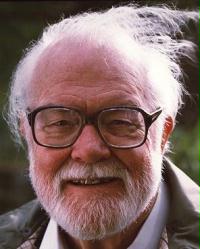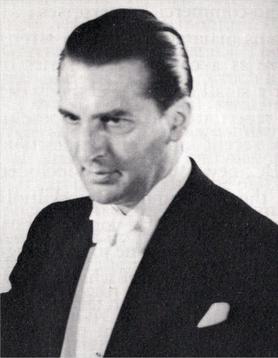
BBC Radio 3 is a British national radio station owned and operated by the BBC. It replaced the BBC Third Programme in 1967 and broadcasts classical music and opera, with jazz, world music, drama, culture and the arts also featuring. The station describes itself as "the world's most significant commissioner of new music", and through its New Generation Artists scheme promotes young musicians of all nationalities. The station broadcasts the BBC Proms concerts, live and in full, each summer in addition to performances by the BBC Orchestras and Singers. There are regular productions of both classic plays and newly commissioned drama.

John Milford Rutter is an English composer, conductor, editor, arranger, and record producer, mainly of choral music.

Sir David Valentine Willcocks, was a British choral conductor, organist, composer and music administrator. He was particularly well known for his association with the Choir of King's College, Cambridge, which he directed from 1957 to 1974, making frequent broadcasts and recordings. Several of the descants and carol arrangements he wrote for the annual service of Nine Lessons and Carols were published in the series of books Carols for Choirs which he edited along with Reginald Jacques and John Rutter. He was also director of the Royal College of Music in London.
The BBC Symphony Chorus is a British amateur chorus based in London. It is the dedicated chorus for the BBC Symphony Orchestra, though it performs with other national and international orchestras.

Sir Charles Barnard Groves CBE was an English conductor. He was known for the breadth of his repertoire and for encouraging contemporary composers and young conductors.

Richard Sidney Hickox was an English conductor of choral, orchestral and operatic music.

Light music is a less-serious form of Western classical music, which originated in the 18th and 19th centuries and continues today. Its heyday was in the mid‑20th century. The style is through-composed, usually shorter orchestral pieces and suites designed to appeal to a wider context and audience than more sophisticated forms such as the concerto, the symphony and the opera.
Andrew Parnell is an organist and harpsichordist.

Simon Halsey, CBE is an English choral conductor. He is the chorus director of the City of Birmingham Symphony Chorus, a position he has held since 1983, and has been chorus director of the London Symphony Chorus since 2012. He is also artistic director of the Berlin Philharmonic Youth Choral Programme and the director of the BBC Proms Youth Choir, and conductor laureate of the Berlin Radio Choir. He is professor and director of choral activities at the University of Birmingham.

Stanford Robinson OBE was an English conductor and composer, known for his work with the BBC. He remained a member of the BBC's staff until his retirement in 1966, founding or building up the organisation's choral groups, both amateur and professional.

The BBC Singers is a professional British chamber choir, employed by the BBC. Its origins can be traced to 1924. One of the six BBC Performing Groups, the BBC Singers are based at the BBC Maida Vale Studios in London. The only full-time professional British choir, the BBC Singers feature in live concerts, radio transmissions, recordings and education workshops. The choir often performs alongside other BBC Performing Groups, such as the BBC Symphony Orchestra, and is a regular guest at the BBC Proms. Broadcasts are made from locations around the country: London venues have included St Giles-without-Cripplegate, St John's, Smith Square and St Paul's Church, Knightsbridge.
The English Baroque Choir was formed in 1978 and has become one of London's finest amateur choirs, developing a reputation for musicality, imaginative programming and choral enthusiasm. As its name suggests, the choir's spiritual home is in the rich music of the Baroque period, with large-scale works by Bach, Handel and Monteverdi regularly appearing in its programmes. However, it is equally at ease with repertoire from the 15th century right through to the present day – commissioning and giving the world premiere of Psalm-Cantata by John McCabe CBE in 2013 – and frequently presents smaller-scale concerts with keyboard, harp, brass or completely a cappella.
There have been three choirs named The BBC Chorus in the history of the British Broadcasting Corporation.
- Today's BBC Symphony Chorus. Founded in 1928 as the BBC National Chorus, it changed its name to the BBC Chorus in 1932, before changing it again in 1935 to the BBC Choral Society.
- A 42-strong professional chorus developed in the 1930s. It would perform either alone or with the BBC Choral Society as a "choir within a choir". It was abolished in 1961 following changes to the BBC's choral structures.
- Today's BBC Singers. Founded in 1924 as a 16-strong BBC Wireless Chorus, and formally renamed The BBC Singers in 1935, it was expanded to 28 in 1961 and renamed The BBC Chorus as part of reforms to the BBC's choral set-up. It was then renamed The BBC Singers once more in 1972.
Bradford Festival Choral Society was founded as a direct result of the opening of St George's Hall in 1853. A massed choir of over 200 singers from far and wide was formed for the first Bradford Musical Festival which took place that year. When the second festival took place in 1856 another choir, consisting of rather more locally based singers, was formed and at the end of the festival it was felt wasteful to disband a group which had already gained such a high reputation. A meeting was held on 17 November 1856 under the chairmanship of Samuel Smith, the original instigator of the construction of St George's Hall, and Bradford Festival Choral Society came into being with Mr Smith as its first President. The conductor was William Jackson who had been the highly successful trainer of the chorus for both festivals. The choir sang and rehearsed at the Hall and soon gained the nickname of the “Coffee and Bun Society” as refreshments were provided for those members travelling from a distance. This arrangement was also intended to discourage possible visits to licensed premises before rehearsal!
Hubert Leslie Woodgate was an English choral conductor, composer, and writer of books on choral music.
Gavin Carr is a British conductor and baritone working with major choruses in the UK and appearing in opera and concert in the UK and around the globe.
Adrian Frederick Partington is an English conductor, chorus master, organist and pianist. He is director of music at Gloucester Cathedral, joint conductor of the Three Choirs Festival and artistic director for the Gloucester festival years, director of the BBC National Chorus of Wales, conductor of Gloucester Choral Society, and former conductor of Bristol Choral Society and leader of the postgraduate choral conducting course at the Royal Welsh College of Music & Drama.
Christopher Edward de Souza is an English composer, teacher, music director, broadcaster, opera producer and author. He has presented programmes on BBC Radio 3, Radio 4 and World Service.
This is a summary of the year 2017 in British music.
This is a summary of the year 2018 in British music.








